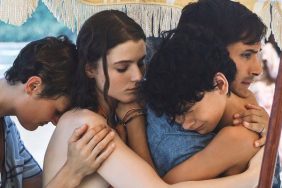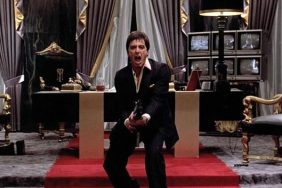
My introduction to you was the year I saw The Postman, which I actually liked and have been a defender of that movie.
Poor Postman. So am I.
And then Rushmore. Was that a whirlwind time for you?
The Postman, Rushmore, Sixth Sense, what a triple. Because the producer of Rushmore brought me in on The Sixth Sense. It was a bizarre and thrilling and extraordinary time because I had no idea what I was getting myself into with The Postman. Rushmore came along as a result of that. I was in L.A. and reading scripts which would have never been sent to me. I came across this beautiful, tiny, eccentric story which I loved and I was in, which has turned into sort of a cult classic.
As a result of Rushmore I was in The Sixth Sense which turned out to be one of the most successful films of that decade. So yeah, it was a whirlwind crazy time and presented me with amazing options. There’s no question, but for The Postman I would not be sitting with you now.
I think I was inclined to defend it because once I hear any kind of backlash, I go in with an open mind. For you to sign on for the second film Kevin Costner was directing, were you surprised? Was there a point where you knew something was turning on the movie?
I had no idea about any of that. All I knew honestly of Kevin Costner was that brilliant film he did where he shagged Sean Young in the back of a limousine.
No Way Out!
Which I love. I was aware of Dances with Wolves, but when he called, I didn’t understand he was actor/producer/director of this blockbuster. Actually it was his third. Waterworld died a horrible death.
That’s sort of a misnomer.
Well, they wouldn’t have given him the money for The Postman if Waterworld hadn’t made money. I knew that Waterworld had been derided and I wasn’t in a position to choose. I was an unemployed actor in London and I was offered a $130 million movie. I didn’t care what Kevin Costner’s critical record is. Yes, I’d like to fly to L.A. first class tomorrow morning, thank you very much.
I also love the genre. I’m fascinated by post-apocalyptic movies and there weren’t a lot at the time in 1997.
No, and it’s a witty [idea]. The original novel is a good book and it’s a great premise. I think Kevin executed it well and with humor, but opinion was just against him at the time, whether that’s because he had left his wife or because people thought he’d gotten too big for his boots. I don’t know but I’m not a party to that, but it’s not something I’m ashamed of. I’m happy to talk about it and I love the film with a passion.
I always geek out about the past movies as well. I’ve become an M. Night defender too.
Yeah, I love The Village. Everyone was hard on The Village. I thought that was a really good film, but maybe that was the one you didn’t like. That was such an outstanding time though. He was 28 or something. Both he and Wes were 28 when I made Rushmore and The Sixth Sense. He just had such an extraordinary, absolute vision. Both of them had this thing of being an auteur, sort of like Polanski, someone who sees an entire created [vision]. You write and people come in going, “No, the film should end like this.”
Can you imagine that with The Sixth Sense or Rushmore? Someone going in and going, “No, it’s got to be a happy ending.” It was astounding and films very often aren’t made like that anymore, but on this it’s been very auteur driven. Both Tommy [Schlamme] and Sam [Shaw] are brilliant enough and experienced enough for us to trust them. We don’t go to them with, “Oh, I don’t think my character would do this.” You get each script and you go, “God, this is so thrilling.”
Wes Anderson has been pretty consistent, but Rushmore was the first movie he really established that aesthetic on. Bottle Rocket didn’t really look like that. Did you have a sense of a very different aesthetic going on?
I was still very ignorant about film then. Now looking back on it with hindsight, I could go, “Yes, of course, I spotted this weird fisheye lens these strange color schemes.” But I honestly didn’t at the time. I just stood where I was told and said what I was told to say. But I knew, and I still stand by this because everything that you see on screen was itemized beautifully in the script. You can buy the script and it reads like a novel. The descriptions in between each piece of dialogue, it’s all there from Max’s green suit and his bow tie to how he sits by his mother’s grave. Every detail was there in Wes’s vision in the screenplay. The only thing I credit myself with was spotting an extraordinary screenplay. In terms of Bob Yeoman’s amazing cinematography and the setting and the style, I didn’t know there was a style to be set, I confess.
I didn’t meet you for “Dollhouse,” but that again, did you have a sense of any of the troubles Joss Whedon had with Fox?
Yes, very palpable. We lived it and Joss is a wonderful employer in that he shares his pain and the progress of every development with his lead cast. It was a painful process. I was brought onto it with the full expectation of exploring in a way, as we do on this show, the moral quandaries and moral dilemmas presented by that weird setup. Is providing people with their fantasy defensible or indefensible? Are the people who provide the fantasy victims or customers or clients or the bosses? I think Joss was very aware of the moral implications of the show and was never allowed to explore them and that was very frustrating for all of us.
Did your character change a lot during development?
I’ve learned with episodic TV that you have to play any situation as if anything can happen the next week. You could peel your face off and be an alien the following episode. But Joss always said that his characters started to become more and more like the people [who played them] as he got to know them. So my character started off as sort of a scary woman in a business suit, ended up being rather motherly and a bit of an alcoholic. I was like, “Is that how you see me?” But I love the way she ended up because she ended up, as I said, being the sort of mother of the story.
By the end of the second season, did “Dollhouse” not ultimately get to explore what Joss wanted?
Yes, there’s that wonderful sense when you’re being cancelled that you can do anything. He ended it once at the end of season one and they amazingly came back. He’s such a clever guy, but he always had his apocalyptic ending and it was just a question of how many seasons it took to get there.
Is there a particular episode of “Manhattan” that’s really good for Liza, that we should watch for?
She has a wonderful moment, it’s the sort of slow burn story. They’ve very cleverly distributed my story a little scene in each one, so you’re going to have to watch the whole thing to get me. She sort of cherry picks her pieces of evidence in each episode.








